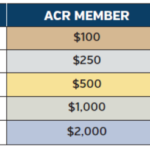Ethically, it’s easy to see the conflict. The system places a premium on money generated in a way that is often independent of the goal of improving the lives of constituents, including our patients. Unfortunately, if we defer participation in the political process until it’s overhauled to a more ethically comfortable state, our profession and our patients may suffer.
To encourage the ACR membership to participate politically, RheumPAC provides a resource to use funds from member donations to access fundraising events. A committee of volunteer rheumatologists determines who to support based on the legislator’s record of supporting rheumatology. Any ACR member can recommend an elected official for consideration.
Success Stories
The ACR, with the aid of relationships built through RheumPAC, was recently able to influence the repeal of the Sustainable Growth Rate (SGR) formula for physician reimbursement under Medicare, delay ICD-10 implementation and have the implementation of ICD-10 occur under more favorable conditions.1
Current Government Affairs Committee Chair William Harvey, MD, was given the opportunity to testify on behalf of legislation we drafted, the Patients’ Access to Treatment Act (HR 1600).2
Across Party Lines
Although success has been achieved, the proportion of ACR members contributing to RheumPAC is relatively low. At a 3.8% member participation rate and $225,000 contributed over the two-year 2014 election cycle, our participation is lower than many other specialties, including Orthopedic Surgery (21% participation, $2,181,500 contributed) and Family Medicine (6% participation, $757,000 contributed).1,3,4,5,6
While serving on the GAC, I found it hard to understand why the percentage of rheumatologists making at least a nominal donation remained small. When I moved from the GAC and shared this concern with the members of the Committee on Ethics and Conflict of Interest, reasons for low participation became clear. I realized the individual decision to donate to politicians, even indirectly through RheumPAC, is ethically complicated. Even if a politician supports rheumatologists’ concerns without reservation, the same politician could support a position that is in direct opposition to what an individual ACR member finds important in areas outside of rheumatology.
For RheumPAC, the primary determining factor is a candidate’s views and actions pertaining to rheumatology. Because major differences of opinion on high-profile issues often exist along party lines, RheumPAC has given its funds as equally as possible to Democrats and Republicans.7
The AMA’s code of ethics states that “physicians have a responsibility to work for the reform of, and to press for the proper administration of, laws that are related to health care. Physicians should keep themselves well informed as to current political questions regarding needed and proposed changes to laws concerning such issues as access to health care, quality of health care services, scope of medical research, and promotion of public health.”8
